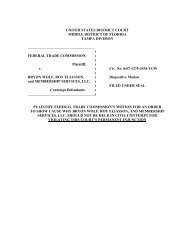Gasoline Price Changes - Federal Trade Commission
Gasoline Price Changes - Federal Trade Commission
Gasoline Price Changes - Federal Trade Commission
You also want an ePaper? Increase the reach of your titles
YUMPU automatically turns print PDFs into web optimized ePapers that Google loves.
GASOLINE PRICE CHANGES:<br />
Through zone pricing, a branded refiner may charge different DTW prices to lessee dealer<br />
stations located in different zones. Through territorial restrictions, a branded refiner may impose<br />
territorial restraints on independent jobbers – that is, independent jobbers may supply branded<br />
gasoline to their own gas stations or open dealers in some locations, but not to others.<br />
A. Zone Pricing.<br />
A price zone typically “is a contiguous set of gasoline stations of the same brand that face<br />
a common set of competitive factors, including competing brands.” 83 A branded refiner uses its<br />
knowledge of geographic features and local demand patterns to define an area of effective local<br />
competition among retailers. This area of effective local competition is the basis for DTW price<br />
zones. A branded refiner’s DTW prices to lessee dealers may differ between different zones.<br />
Zones may change over time, depending on evolving competitive factors. See Figure 5-12.<br />
4<br />
3<br />
2<br />
1<br />
Figure 5-12: Hypothetical Example of <strong>Price</strong> Zones<br />
O<br />
B<br />
O<br />
A - Firm A Station B - Firm B Station O - Other Firm Station<br />
Firm B <strong>Price</strong> Zone 1<br />
O<br />
O<br />
A<br />
Firm A <strong>Price</strong> Zone<br />
0<br />
-1 -0.5 0 0.5 1 1.5 2 2.5 3 3.5 4<br />
O<br />
Firm B <strong>Price</strong> Zone 2<br />
Some assert that zone pricing is anticompetitive and leads to higher retail prices for<br />
gasolin e.<br />
ive<br />
are<br />
84 Two principal antitrust concerns are raised: (1) zone pricing may allow branded<br />
refiners to coordinate wholesale gasoline prices more effectively; and (2) zone pricing may g<br />
branded refiners the ability to deter entry through localized price cuts – that is, brand-name<br />
refiners might lower DTW prices to lessee dealers only in price zones that new competitors<br />
trying to enter, thus making entry less profitable (or perhaps even unprofitable) for the new<br />
entrant. 85<br />
126<br />
O<br />
B<br />
B<br />
O<br />
A<br />
FEDERAL TRADE COMMISSION, JUNE 2005
















